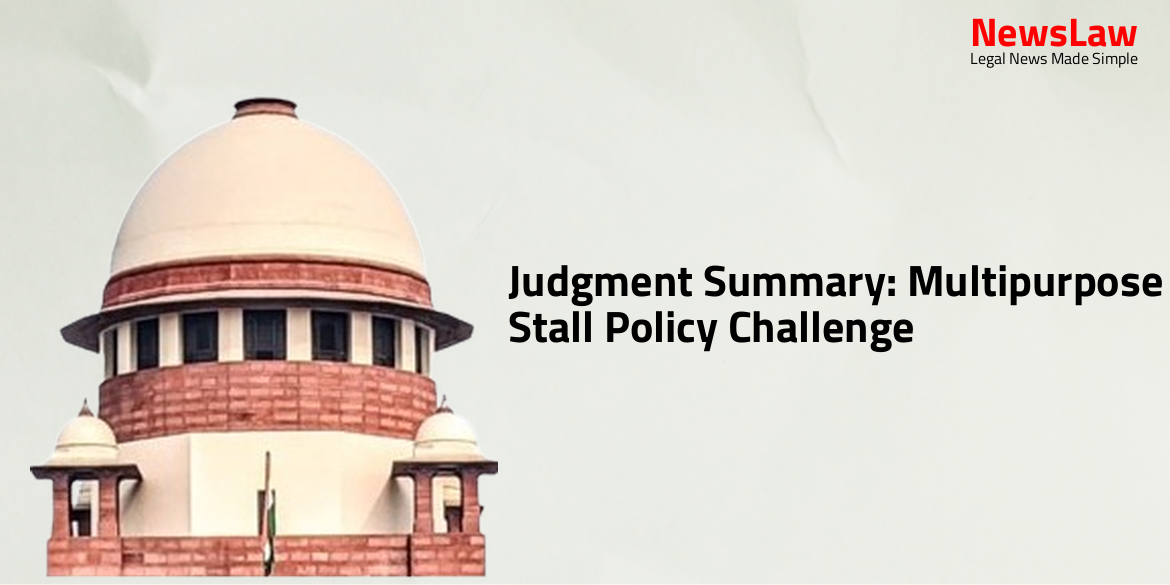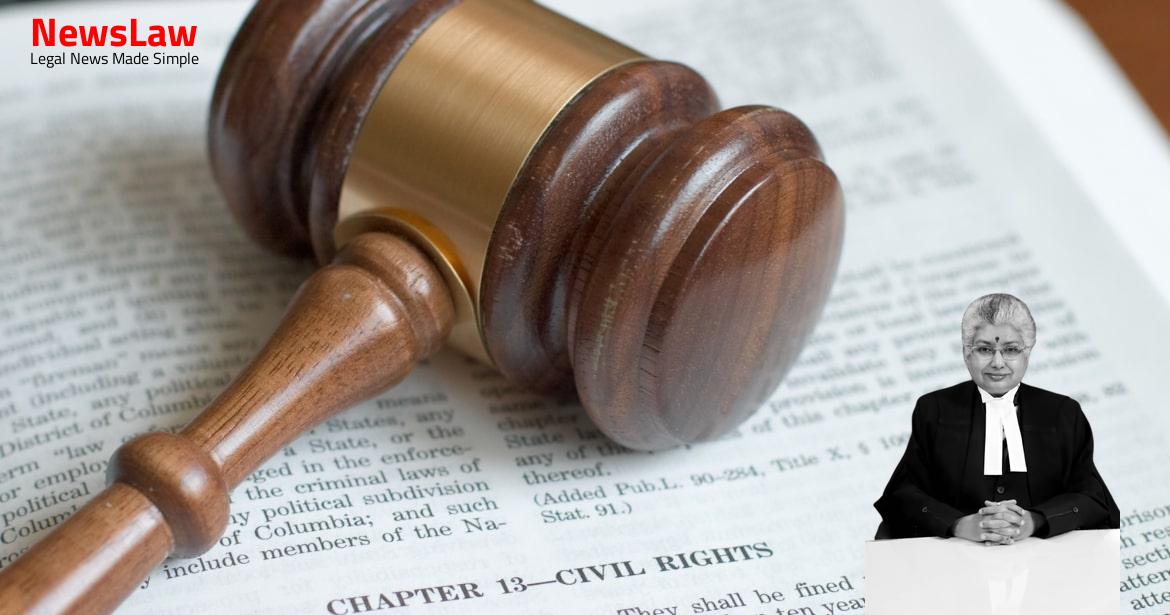In a recent judgment by the Delhi High Court, the challenge to the Multipurpose Stall Policy was addressed, involving the rights and obligations of the parties involved. The case centered around the extension of license periods and the implications for existing stall owners like Petitioner 1, Petitioner 2, and Petitioner 3. Stay tuned to learn more about the court’s decision on this significant policy challenge.
Facts
- The tenure of petitioners’ licenses was initially for five years from the date of conversion of stall/trolley until 21.12.2022.
- Due to the force majeure event, Covid-19 lockdown, the tenure was extended by 68 days until 27.02.2023.
- The Master License Agreements and the extension letters have been challenged in the petition.
- There is a clause in the agreement stating no extension or renewal is allowed.
- Petitioner 2 and Respondent 2 signed the Master License Agreement on 29.10.2021.
- The petitioners have contested Clause 5 and Clause 11 of the 2017 Policy by the Railway Board in Delhi.
- Petitioner 3 and Respondent 2 entered into a Master License Agreement on 17.08.2020.
- In the letters sent, the petitioners were instructed to vacate their MPS by 27.02.2023.
- Petitioner 1 operates three MPS at Bareilly Railway Station, Petitioner 2 runs one at Moradabad Railway Station, and Petitioner 3 runs one at Haridwar Railway Station.
- The petitioners were compelled to convert their stalls/trolleys to MPS in 2017 by Northern Railway in accordance with Commercial Circular No. 61 of 2017.
- Various agreements were executed between the petitioners and Northern Railway to formalize the license arrangement.
Arguments
- The petitioners argue that the 68-day extension of the contract is arbitrary, especially compared to longer extensions granted to other MPS units in different railway zones due to Covid-19.
- They contend that the reduction in foot traffic at railway stations during the lockdown led to a decrease in license fees from June 2020 to March 2022, and the petitioners should be entitled to a proportional extension of the license period.
- The petitioners challenge Clause 5 of the 2017 Policy, stating it violates Article 14, Article 19(1)(g), and Article 21 by removing the right of license renewal and forcing existing licensees to compete against larger companies.
- They seek a writ of mandamus to compel the relevant zonal railways to renew and extend their licenses, despite their licenses expiring due to time lapse.
- The petitioners claim that the 2017 Policy unfairly applies universally to stall/trolley owners without considering the existing stall/trolley owners individually.
- They argue against the non-renewal or extension of licenses as stated in the 2017 Policy and compare their situation to other cases where licenses were renewed under similar circumstances.
- The petitioners express a legitimate expectation that their licenses would be renewed and sustained for future generations, and that the authorities should permit them to do so.
- They cite previous legal decisions and judgments to support their arguments and challenge the actions of the respondents as arbitrary and violative of their fundamental rights.
- The petitioner signed a non-renewable contract for a period of five years with eyes wide open.
- The petitioner enjoyed the benefits of the contract for the entire duration.
- The petitioner cannot now revert to a policy no longer in existence or applicable to them.
- The judgment of the Supreme Court relied upon by the petitioner was regarding Catering Policy, not Multipurpose Stall Policy.
- The petitioner cannot request to be brought under a previous policy after contract completion.
- The contract in question does not fall under the Catering Policy discussed in the Supreme Court judgment.
Analysis
- The 2017 Policy includes a 33% sub quota for women in allotment of each reserved category of MPS at all stations.
- Clause 9 of the 2017 Policy provides for reservation in allotment for marginalized sections of society.
- The petitioners voluntarily converted their stalls/trolleys to MPS as per the railway scheme.
- The railways issued a letter invoking the Force Majeure clause for all catering and vending contracts due to the lockdown.
- The petitioners cannot claim an indefeasible right of renewal under the Easements Act or the 2017 Policy.
- The 2017 Policy ensures reservation of MPS units for specific categories and marginalized groups.
- There is no provision for renewal or extension in the 2017 Policy for MPS units.
- The petitioners’ legitimate expectation for renewal lacks merit as it is not a guaranteed right.
- Challenges to Clause 5 and 11 of the 2017 Policy are deemed unsustainable.
- Extension of license period was granted to petitioners due to force majeure events like Covid-19 lockdown.
- The railways have the authority to re-tender MPS units after the agreed tenure concludes.
- The petitioners can participate in fresh bids if they meet eligibility criteria as per the 2017 Policy.
- The 2017 Policy reserves a specific percentage of MPS units for different marginalized categories and individuals.
- The challenge against the 2017 Policy’s clauses regarding extension or renewal of licenses is unfounded.
- The railways have the discretion to make policy decisions based on prevailing circumstances for better administration.
- The 2017 Policy creates reservations and sub-quotas to rectify disparities in opportunities within marginalized groups.
- The zonal railways extended license periods based on ground realities and force majeure events like Covid-19.
- Applicants praised the conversion of stalls/trolleys to multipurpose stalls as per the policy.
- Force Majeure clause was implemented for catering and vending contracts due to the Covid-19 pandemic.
- The relevant extract from the judgment states the following points:
- Point 1.
- Point 2.
- Point 3.
- Point 4.
- Point 5.
- The courts have the jurisdiction to declare the law as unconstitutional.
- In the case of Gulfeeza Begum v. Union of India, the Karnataka High Court rejected a challenge to the 2017 Policy, stating that a breach or threat to breach a fundamental, statutory, or enforceable equitable right is necessary for a writ of Mandamus to be issued.
- The court cannot delve into specific factual situations at each railway station to review extension granted to individual licensees.
- Judicial review of a policy decision differs from issuing a Mandamus to frame policy in a particular manner.
- A legitimate expectation does not always entitle the expectant to relief, as public interest, policy changes, or conduct of the expectant can negate it.
- Arbitrary denial of license renewal by a public body is not permissible under the constitutional system.
- Policy decisions cannot be challenged through Mandamus unless related to enforcement of a fundamental right or statutory duty.
- Mandamus cannot be used to direct the enactment of laws or rules.
- Individual license agreements between the petitioner and railway authorities contain an arbitration clause.
- The 2017 Policy, applicable to licensees without a formal license agreement, also includes an arbitration clause.
- Petitioners can invoke the arbitration clause if aggrieved by insufficient extension due to Covid-19 or to claim damages.
Decision
- Existing stalls/trolleys have the option to convert into Multi-Purpose Stalls (MPS) as per the 2017 Policy.
- Petitioners opted for the conversion option for their stalls/trolleys.
- The tenure for converted stalls to MPS will be 5 years from the date of conversion.
- Space for new MPS will be allotted after the expiry of current agreements.
- Applicant agrees to the conditions and rules for conversion to MPS.
- The present petitions are deemed maintainable and will be adjudicated on merits.
- Existing stalls have the option to convert to MPS by paying the quoted License Fee.
- Renewal of License period is for 5 years from the date of conversion.
- Petitioners have requested conversion of their stalls to MPS and are willing to pay revised fees.
- Court grants 3 months from the extended license period or judgment date for petitioners to vacate stalls.
Case Title: M/S MAHESHCHAND AND CO. Vs. UNION OF INDIA & ORS. (2024:DHC:4452)
Case Number: W.P.(C)-6413/2024



